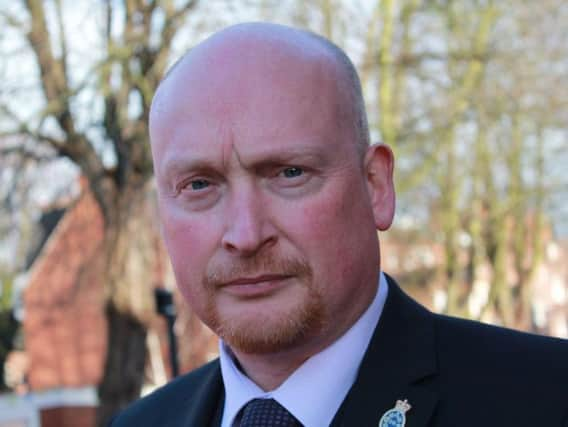Officers have 'no faith' in police watchdog investigations - Yorkshire boss claims


Brian Booth was speaking after Home Secretary Priti Patel suggested time limiting investigations by the Independent Office for Police Conduct (IOPC).
Mr Booth said: "It's a breath of fresh air to hear a Home Secretary tackling the real issues that have stagnated policing over the past decade.
Advertisement
Hide AdAdvertisement
Hide Ad"To have these ineffective, untimely and wasteful investigations continuing, unchecked is no good for officers' mental welfare and creates no confidence that fair investigations are taking place.
"But the picture also involves the waste of public money and the frustration caused to complainants who want a timely resolution to their concerns.
"The IOPC needs a clean sweep and I hope the Home Secretary brings a brush, because it is a mess."
In her first major address to the service as Home Secretary at the Superintendents' Association Conference this month, Priti Patel spoke about the “injustice” of lengthy investigations into the country’s police officers, leaving them in limbo. She called for better, swifter processes to protect officers and the public.
Advertisement
Hide AdAdvertisement
Hide Ad“We cannot have officers having their professional careers basically suspended while investigations and enquiries take place. That does a huge disservice and an injustice to everyone in policing, I think. To the officers in particular.”
Ms Patel said investigations needed to be looked at on a case-by-case basis, and did concede that there was a lot of information and evidence to be gathered.
She said: “Police officers have a deadline effectively put on them to get their jobs done. We must have exactly the same approach when it comes to the IOPC.
She said more needs to be done to support officers through these “really torrid experiences”.
Advertisement
Hide AdAdvertisement
Hide AdMs Patel has been working with IOPC Director General Michael Lockwood on the issue, after police representatives complained of the undue stress caused by lengthy investigations on officers and their families.
What the IOPC say
An IOPC spokeswoman confirmed the watchdog completes more than 80 per cent of its investigations within 12 months and that after an investigation the IOPC cannot influence dates for events like misconduct hearings, which are arranged by police forces and criminal proceedings - set by the courts and Crown Prosecution Service.
The spokeswoman said: "The Federation has presented a very one-sided view which does not represent our work. Only one of the 15 active cases we have from West Yorkshire Police is over 12 months. That case has been delayed in part due to parallel criminal case. This investigation is due to be concluded in the next couple of months but is still subject to an inquest.
"We have acknowledged, on a number of occasions, that we want our investigations to be quicker and we are making great strides to do so. Across England and Wales, more than 80 percent of IOPC investigations are now completed within 12 months*. Where investigations are complex, or where there are related proceedings – for example criminal or coronial hearings – the IOPC cannot control or influence the timings and our investigation may be paused.
Advertisement
Hide AdAdvertisement
Hide Ad"The Federation are more than aware of the efforts going into improving the police complaints system for all concerned and their comments are disappointing given the regular meetings and discussions we have with them.
"Our job is to ensure the public can have confidence in policing – we do this through improving complaints and through independent and impartial investigations.
"When we investigate allegations of misconduct, these are generally matters referred to us by police forces. The vast majority of police officers and staff are professional and uphold the highest standards in policing, and in many cases we find there was no case to answer for misconduct, which effectively clears officers of any wrongdoing.
"Some cases we investigate find there is a case to answer for very serious misconduct issues – assaults, use of power for sexual gain, discrimination, perverting the course of justice or withholding evidence - where police face dismissal or, in some cases, criminal proceedings.
Advertisement
Hide AdAdvertisement
Hide Ad"Our investigations help strengthen policing practice by identifying organisational learnings where improvements could be made or where policy or procedures could be clearer. This helps police do their job better and is not a waste of taxpayer money. Examples include making recommendations for changes to custody suites to reduce the risk of deaths in custody, cross-force communication, preserving evidence, and how officers deal with investigations into domestic abuse. **
"We do not determine disciplinary actions against police. If we find a case to answer, we make a recommendation(s) to the relevant force and it is a matter for them alone to then consider. This may also extend the period of time an officer is without an outcome, and is not determined by the IOPC.
"The welfare of officers – most of which are treated as witnesses to our investigations – is highly important to us and is a constant consideration during investigations."
The spokeswoman added that the IOPC is not aware of any investigatory body which has a time limit on how long an investigation should take.
Advertisement
Hide AdAdvertisement
Hide AdShe said: Some of our investigations are very complex and some are historic. While we are committed to reducing this as much as we can, a time limit would mean the Hillsborough, Rotherham or the Stephen Lawrence corruption investigations would have been abandoned. For any investigation, it would mean if we approach a time limit but new evidence comes to light, or if criminal or coronial proceedings create a delay to an investigation, we would not be able to continue investigating, and serious misconduct and corruption by police would not be addressed. That can’t be right."